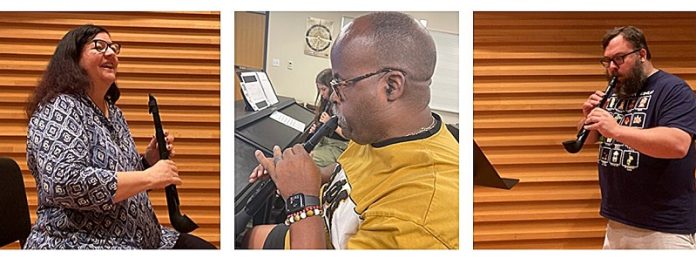
In a groundbreaking study, researchers from the University of South Florida (USF) are discovering that music, specifically learning to play a musical instrument, can help improve cognition in cancer patients undergoing chemotherapy.
The study, led by USF professor of music education Jennifer Bugos and breast surgical oncologist Dr. Melissa Mallory, explores how private and group piano lessons can boost cognitive function and daily abilities in patients.
The piano program, called Keys to Staying Sharp, offers more than just basic piano lessons.
It includes a focus on patterns and repetition, aiming to enhance mental skills.
While similar studies have been done with cancer survivors, this is the first time such music training has been offered to patients actively undergoing chemotherapy.
“Cancer diagnosis and treatment can have a major impact on mental health,” said Dr. Mallory.
“We need new, non-medication strategies to improve patient outcomes and overall wellness, and music training could be a great option.”
Preliminary results show that patients participating in group piano lessons experienced improvements in executive functions, which involve skills like planning, attention, and memory.
Participants also reported that learning to play the piano was enjoyable and helped them relax during stressful times.
One participant, Robin Hesselink, who is undergoing treatment for stage IV metastatic breast cancer, shared her positive experience: “Practicing the piano was something I looked forward to. It helped me focus on something positive and enjoyable, even if just for 30 minutes.”
The study is still in its early stages, with 15 participants, but it has already gained attention, including a two-year funding renewal from the National Endowment for the Arts. Bugos is also expanding her research to include COVID-19 survivors.
In a separate study, Bugos found that playing a JSax—a smaller version of the saxophone—helped COVID-19 survivors improve their lung function and cognitive abilities. Using a spirometer, her team found that participants doubled their respiratory capacity and performed better on cognitive tests, showing improvements in memory, attention, and decision-making.
Music participant Darlene DeMarie said, “Learning the JSax was challenging, but seeing my progress over time was rewarding. Music felt like therapy and made a positive difference in my life.”
Bugos is now extending her research to adults of all ages, including those who have never played an instrument before. The goal is to identify how music training can improve cognitive performance and motor skills, with a focus on fine and gross motor activities.
This study will involve 12 weeks of 90-minute music lessons for participants aged 18–25 and those over 60. The team will analyze how music training affects memory, attention, and processing speed in different age groups and determine how much training is necessary to maintain these cognitive benefits.
“Learning a musical instrument is a challenging activity that can help strengthen the brain’s neural pathways, ultimately improving cognition,” Bugos explained.
If you care about COVID, please read studies about vitamin D deficiency linked to severe COVID-19, death, and how diets could help manage post-COVID syndrome.
For more health information, please see recent studies that low-sodium plant-based diets may prevent COVID-19 better, and results showing zinc could help reduce COVID-19 infection risk.



